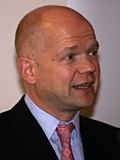
Michael Ray Dibdin Heseltine, Baron Heseltine, is a British politician. Having begun his career as a property developer, he became one of the founders of the publishing house Haymarket. Heseltine served as a Conservative Member of Parliament from 1966 to 2001. He was a prominent figure in the governments of Margaret Thatcher and John Major, and served as Deputy Prime Minister and First Secretary of State under Major.
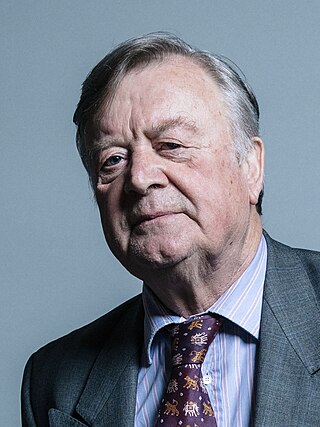
Kenneth Harry Clarke, Baron Clarke of Nottingham,, is a British politician who served as Home Secretary from 1992 to 1993 and Chancellor of the Exchequer from 1993 to 1997. A member of the Conservative Party, he was Member of Parliament (MP) for Rushcliffe from 1970 to 2019 and was Father of the House of Commons between 2017 and 2019. The President of the Tory Reform Group since 1997, he is a one-nation conservative who identifies with economically and socially liberal views.
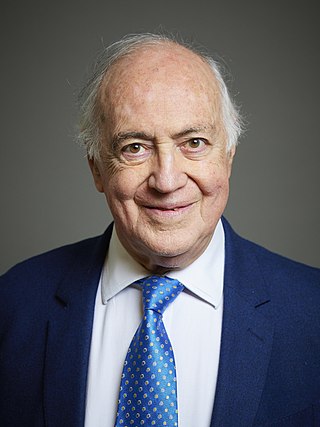
Michael Howard, Baron Howard of Lympne is a British politician who served as Leader of the Conservative Party and Leader of the Opposition from November 2003 to December 2005. He previously held cabinet positions in the governments of Margaret Thatcher and John Major, including Secretary of State for Employment, Secretary of State for the Environment and Home Secretary.

William Jefferson Hague, Baron Hague of Richmond, is a British politician and life peer who served as Leader of the Conservative Party and Leader of the Opposition from 1997 to 2001. He was the Member of Parliament (MP) for Richmond (Yorks) in North Yorkshire from 1989 to 2015. He served in the Cameron government as First Secretary of State from 2010 to 2015, Foreign Secretary from 2010 to 2014, and Leader of the House of Commons from 2014 to 2015.

Sir John Alan Redwood is a British politician and academic who has been the Member of Parliament (MP) for Wokingham in Berkshire since 1987. A member of the Conservative Party, he was Secretary of State for Wales in the Major government and was twice an unsuccessful candidate for the leadership of the Conservative Party in the 1990s. Redwood subsequently served in the Shadow Cabinets of William Hague and Michael Howard; he has remained a backbencher since then.

The Pro-Euro Conservative Party was a British political party announced by John Stevens and Brendan Donnelly in February 1999, formed to contest the 1999 European Parliament election. The founders were Members of the European Parliament who had resigned from the UK Conservative Party in protest at its anti-euro stance. Their reported aim was to replace Eurosceptic William Hague as Conservative leader with Europhile Kenneth Clarke. Stevens later said that they had intended to push Ken Clarke, Michael Heseltine, Chris Patten and other pro-Europeans in the Conservative Party into "an SDP-style breakaway, in combination with the Liberal Democrats". The Pro-Euro Conservative Party disbanded in 2001.

Peter Bruce Lilley, Baron Lilley, PC is a British politician and life peer who served as a cabinet minister in the governments of Margaret Thatcher and John Major. A member of the Conservative Party, he was Member of Parliament (MP) Hitchin and Harpenden from 1997 to 2017 and, prior to boundary changes, St Albans from 1983.

Stephen James Dorrell is a British Liberal Democrat politician. He served as the Conservative Member of Parliament (MP) for Loughborough between 1979 and 1997 and then for Charnwood from 1997 to 2015.

Eric Forth was a British Conservative politician. He served as Member of the European Parliament (MEP) for Birmingham North from 1979 to 1984. He then served as Member of Parliament (MP) for Mid Worcestershire from 1983 to 1997. Finally, he served as MP for Bromley and Chislehurst from 1997 until his death in 2006.
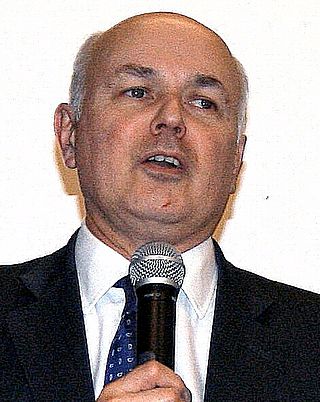
The 2001 Conservative Party leadership election was held after the party failed to make inroads into the Labour government's lead in the 2001 general election. Party leader William Hague resigned, and a leadership contest was called under new rules Hague had introduced. Five candidates came forward: Michael Ancram, David Davis, Kenneth Clarke, Iain Duncan Smith and Michael Portillo.

The 2005 Conservative Party leadership election was called by party leader Michael Howard on 6 May 2005, when he announced that he would be stepping down as Leader of the Conservative Party in the near future following the party's third successive general election defeat. However, he stated that he would not depart until a review of the rules for the leadership election had been conducted, given the high level of dissatisfaction with the current system. Ultimately, no changes were made and the election proceeded with the existing rules, which were introduced in 1998.

The Conservative Party is the oldest political party in the United Kingdom and arguably the world. The current party was first organised in the 1830s and the name "Conservative" was officially adopted, but the party is still often referred to as the Tory party. The Tories had been a coalition that more often than not formed the government from 1760 until the Reform Act 1832. Modernising reformers said the traditionalistic party of "Throne, Altar and Cottage" was obsolete, but in the face of an expanding electorate 1830s–1860s it held its strength among royalists, devout Anglicans and landlords and their tenants.

The leader of the Conservative Party is the highest position within the United Kingdom's Conservative Party. The current holder of the position is Rishi Sunak, who was elected to the position on 24 October 2022, following his unopposed victory in the party's leadership election.

During the 1980s, members of the British Conservative Party who opposed some of the more hard-line policies of Prime Minister Margaret Thatcher, were often referred to by their opponents as "wets". Thatcher coined the usage in 1979–80, with the meaning of feeble, lacking hardness, or willing to compromise with the unions. The label was especially applied to senior members of Thatcher's government who were nevertheless outside her inner circle and who expressed opposition to her strict monetarist policies, and her cuts to public spending.
The 1990 Conservative Party leadership election was called on 14 November 1990 following the decision of Michael Heseltine, former defence and environment secretary, to challenge Margaret Thatcher, the incumbent Prime Minister of the United Kingdom, for leadership of the Conservative Party.
The 1989 Conservative Party leadership election took place on 5 December 1989. The incumbent Margaret Thatcher was opposed by the little-known 69-year-old backbencher MP Sir Anthony Meyer. It was the Conservative Party's first leadership election for nearly 15 years, when Thatcher had taken the party leadership.

The 1995 Conservative Party leadership election was initiated when the incumbent leader and prime minister, John Major, resigned on 22 June 1995, in order to face a leadership challenge from his critics within the party. On 4 July 1995, he was re-elected, beating the only other candidate, the former Secretary of State for Wales, John Redwood.
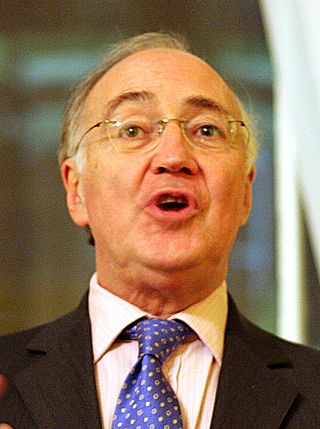
The 2003 Conservative Party leadership election was held due to the enforced resignation of incumbent leader Iain Duncan Smith, who lost a confidence vote among his parliamentary party. The causes of Duncan Smith's fall are often cited as his lack of charisma and impact with the public, the uninspired direction of the party under his leadership, and his previous failure to achieve more than a third of support among members of parliament in the 2001 leadership contest. In the event, the Conservative Party coalesced around Michael Howard as replacement leader and there was not a contest to replace Duncan Smith.
Sir George Arthur Gardiner was a British Conservative Party politician and journalist who served as the Member of Parliament (MP) for Reigate from 1974 to 1997. Two months before the 1997 general election he defected to the Referendum Party, becoming the only MP it ever had. The party dissolved later that year.
